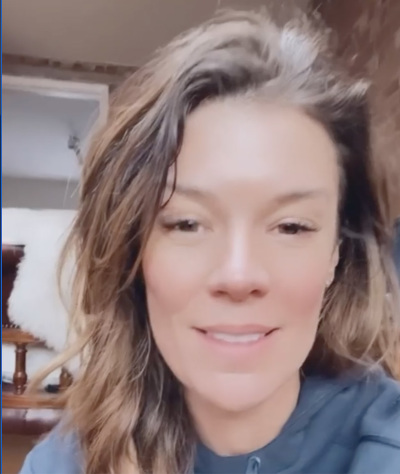Former Bethel leader speaks out on church's beliefs, grave sucking and gold dust

A former leader at Bethel Church in Redding, California, which is often criticized for some of its charismatic practices, has broken her silence by writing a response to some of the more common criticisms of the megachurch.
Carrie Lloyd was both a student and teacher at Bethel Church’s School of Supernatural Ministry. Over the years, she has refrained from commenting on the speculation and onslaught of criticisms that have been lobbed against the Pentecostal ministry.
For the sake of "unity," Lloyd said she felt compelled to speak up in an op-ed published by Premier Christianity.
"But amidst keeping silent, and since my transition out of Bethel to pastures newly-founded towards social justice, I have seen a great dent being created within the unity of the church body," she wrote. "It has been caused primarily by misinformation and untruths. Perhaps then, this piece could be seen less as a statement of defense, and more a willful hope for clarity and reason."
The church's senior leaders, Bill and Beni Johnson, have both been accused of heretical acts.
Bill Johnson’s book, Jesus Christ is Perfect Theology has come under scrutiny for promoting the belief that it's always God’s will to heal someone. And Beni Johnson has been criticized for her emphasis on angelology. She reportedly once suggested in a blog post that is no longer accessible, that there are “different kinds of angels: messenger angels, healing angels, fiery angels” who have “fallen asleep.”
She was also accused of “grave soaking” — which later came to be called grave sucking — after posting photos of herself lying atop the graves of iconic Christians such as C.S. Lewis.
“The grave sucking accusations came from as long as 15 years ago,” Lloyd wrote in the op-ed. “Based on a photograph where someone was lying on the grave of a legend in the faith, a legacy they admired deeply."
"They expressed their treasuring of their existence by lying down in a state of wonder," she continued. "There was no séance, no calling back the dead, no soaking of anointing, and certainly no straws (not even sustainable ones) present.”
Students of the church, she adds, are the ones who took things a step further after “another influential preacher” said, “I’d suck the anointing from that spot if I could!”
Lloyd chalked it all up to “gossip and distant assumption."
"[I]t leaves no room for questions," she wrote. "Especially not with those who posted the picture in the first place. I learned quickly that, as pastors in a diverse environment, we should not control the student’s response but quietly ask them for biblical expositions as to how they got there."
In her op-ed, Lloyd also addressed other criticisms leveraged at Bethel, including "buckets left at the front of the stage for vomiting" and the "refusal for ambulances when someone is in cardiac arrest, as we teach the students instead to pray for healing."
Lloyd said the buckets are "actually for our offering," and that while she prays for healing, she also calls 911 during emergencies.
One of the most well-known criticisms of Bethel, however, is the claim that gold dust has mysteriously fallen from the ceiling during corporate worship events. Bill Johnson described this phenomenon as a “glory cloud" and a supernatural sign of God’s presence.
Lloyd stood behind that claim and said it's one she “can’t explain."
“The gold dust we still can’t explain, even after my thorough hunt for hidden air vents, or drum kits marinated in glitter, (both such things absent from the sanctuary). After hour-long interrogations by friends and family, I gave up explaining,” she added.
“A year after being a student here, and witnessing this gold-like essence hovering over the congregation, going upwards, in figures of eight and then swooshing across the room, the leaders watched baffled, as I found myself on my knees, amid this cloud, cry-whispering to him: ‘Lord forgive me for my unbelief.’"
Lloyd said it was "lovely" to encounter the wonder of God’s “playfulness.”
Bethel reportedly has 11,000 members, including the students at its school. The school claims to be led by "apostles, prophets, evangelists, pastors and teachers" and has also been the source of much criticism.
The ministry made headlines in 2019 after Bill Johnson and the congregation prayed for the resurrection of his worship leader’s 2-year-old daughter.
Johnson said at the time that he and his church family believed God called them to follow the precedent that Jesus set forth by commanding His followers to raise the dead.
Bethel Music worship leader Kalley Heiligenthal started the charge after she asked supporters in an Instagram post to pray for her 2-year-old daughter, Olive, after she stopped breathing and was pronounced dead by doctors.
The church's controversial teachings prompted one worship leader, Mackenzie Morgan, to reveal she will no longer sing their popular worship songs.
“Theology matters,” she wrote in a social media post back in July. “I can’t even stress that enough. It matters if a song is weak in theology and is not accurately displaying the Holiness of our God. It matters if churches are spreading a prosperity [g]ospel that is different from the Gospel found in Scripture. It MATTERS that each Sunday churches pay royalties to these churches in order to be able to sing their music, furthering [their] outreach and their false gospel message.”
The singer said she regrets having “supported these churches” by singing their songs and “opening up the doors for others to discover their false teachings.”
“What if the majority of the church is leading its people astray singing music that is less than worthy of a Sovereign and Holy God?” she asked.
Jeannie Ortega Law is a reporter for The Christian Post. Reach her at: [email protected] She's also the author of the book, What Is Happening to Me? How to Defeat Your Unseen Enemy Follow her on Twitter: @jlawcp Facebook: JeannieOMusic





















